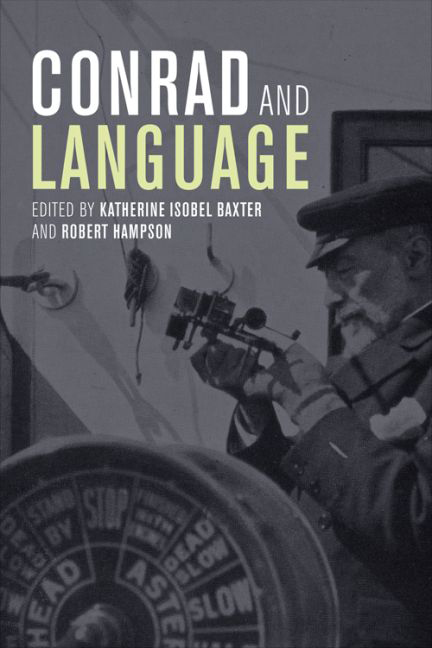Book contents
- Frontmatter
- Contents
- A Note on Texts
- Introduction
- 1 Conrad and Nautical Language: Flying Moors and Crimson Barometers
- 2 Navigating the ‘Terroristic Wilderness’: Conrad's Language of Terror
- 3 Conrad, G. E. Moore and Idealism
- 4 Conrad's Language of Passivity: Unmoving towards Late Modernism
- 5 The Powers of Speech in Conrad's Fiction
- 6 ‘Soundless as Shadows’: Language and Disability in the Political Novels
- 7 Conrad and Romanised Print Form: From Tuan Almayer to ‘Prince Roman’
- 8 Languages in Conrad's Malay Fiction
- 9 Gallicisms: The Secret Agent in Conrad's Prose
- 10 ‘The speech of my secret choice’: Language and Authorial Identity in A Personal Record
- 11 The Russian Redemption of The Secret Agent and Under Western Eyes
- Afterword
- Contributors
- Index
4 - Conrad's Language of Passivity: Unmoving towards Late Modernism
Published online by Cambridge University Press: 12 September 2017
- Frontmatter
- Contents
- A Note on Texts
- Introduction
- 1 Conrad and Nautical Language: Flying Moors and Crimson Barometers
- 2 Navigating the ‘Terroristic Wilderness’: Conrad's Language of Terror
- 3 Conrad, G. E. Moore and Idealism
- 4 Conrad's Language of Passivity: Unmoving towards Late Modernism
- 5 The Powers of Speech in Conrad's Fiction
- 6 ‘Soundless as Shadows’: Language and Disability in the Political Novels
- 7 Conrad and Romanised Print Form: From Tuan Almayer to ‘Prince Roman’
- 8 Languages in Conrad's Malay Fiction
- 9 Gallicisms: The Secret Agent in Conrad's Prose
- 10 ‘The speech of my secret choice’: Language and Authorial Identity in A Personal Record
- 11 The Russian Redemption of The Secret Agent and Under Western Eyes
- Afterword
- Contributors
- Index
Summary
Words and language are not wrappings in which things are packed for the commerce of those who write and speak. It is in words and language that things first come into being and are.
This chapter will engage some commonplaces of Conrad scholarship in order to initiate a new line of inquiry into the writer's exploration of language and subjectivity. The analysis will trace the emergence of a new subject and the manner in which its ontological permutations determine the rethinking of plot and event in Conrad's fiction. Such a rereading of Conrad is informed by a quandary that infects literary endeavour well into late modernism. As Samuel Beckett commented: ‘The material of experience is not the material of expression and I think the distress you feel, as a writer, comes from a tendency on your part to assimilate the two.’ Drawing from a number of canonical texts including The Nigger of the ‘Narcissus’, ‘Heart of Darkness’, Lord Jim and Victory, the chapter will show that the categorical separation between experience and expression – and the problem it poses for an early modernist writer such as Conrad – is everywhere evident in the thematic and stylistic makeup of his fiction. Much has been said about the epistemological uncertainty arising from this divide and the literary techniques to which it gives rise, impressionism and delayed decoding being two familiar examples. This study focuses rather on its distinct ontological articulations in the refashioning of plot, narrative voice and character.
Reframing the above-mentioned works in accord with Beckett's insight will demand we read against three of the mainstays of Conrad criticism. First, Lord Jim will be read not as evolving around a series of revisitations of Jim's seminal jump off the Patna but as a serial restaging of an altogether different moment of inception in the novel. Marlow describes his initial meeting with Jim as an unsolicited encounter with the language of the other.
- Type
- Chapter
- Information
- Conrad and Language , pp. 64 - 81Publisher: Edinburgh University PressPrint publication year: 2016

